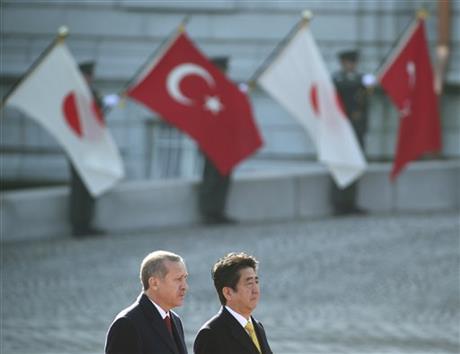
By ELAINE KURTENBACH
Turkish Prime Minister Recep Tayyip Erdogan, left, and Japanese Prime Minister Shinzo Abe attend a welcome ceremony at Akasaka State Guest House in Tokyo, Tuesday, Jan. 7, 2014. (AP Photo/Koji Sasahara)
Recep Tayyip Erdogan, Shinzo Abe
Turkish Prime Minister Recep Tayyip Erdogan, center, and Japanese Prime Minister Shinzo Abe attend a welcome ceremony at Akasaka State Guest House in Tokyo, Tuesday, Jan. 7, 2014. (AP Photo/Koji Sasahara)
Japan Turkey
Japanese Prime Minister Shinzo Abe, right, offers a handshake with Turkish Prime Minister Recep Tayyip Erdogan, left, at the end of their joint press announcement at the state guesthouse in Tokyo Tuesday, Jan. 7, 2014. Japan and Turkey have agreed to begin talks on an economic partnership agreement, part of a drive to build closer ties as they also step up cooperation on nuclear technology.(AP Photo/Toshifumi Kitamura, Pool)
Prev 1 of 3 Next
TOKYO (AP) — Japan and Turkey agreed Tuesday to begin talks on an economic partnership agreement, part of a drive to build closer ties as they also step up cooperation on nuclear technology.
Japanese Prime Minister Shinzo Abe and his Turkish counterpart, Recep Tayyip Erdogan, agreed during talks in Tokyo to launch negotiations on the partnership pact.
The two sides also signed an agreement to set up a science and technology university in Istanbul which is expected to facilitate technology transfers and help Turkey build expertise in nuclear energy. Japan pledged support for the project in May.
Abe and Erdogan also agreed to push for faster approvals for construction of a $22 billion nuclear plant involving Japan’s Mitsubishi Heavy Industries and Areva of France.
Since taking office just over a year ago, Abe has sought to raise Japan’s global profile, build economic ties and drum up business for major Japanese corporations. He jokes that he is the country’s top salesman.
Turkey is modernizing its infrastructure and energy sector and thus is a key market for major Japanese industrial groups such as Mitsubishi and Sumitomo. Japanese exports of vehicles, electronics and energy equipment gave it a trade surplus of about $3 billion with Turkey in 2012.
However, Japan’s $1 billion cumulative investment in Turkey is a tiny fraction of total foreign investment.
“Both sides recognize that this is not realizing our full potential,” Erdogan said.
Japanese media reported that Japan and Turkey also are discussing joint development of motors for tanks in what would be a rare defense-related project for Tokyo, whose military technology collaboration is mostly limited to its close ally, the United States.
The Kyodo News agency said Erdogan was hoping to win agreement on that project, which would involve Mitsubishi Heavy Industries working on a motor for Turkey’s Altay tank.
Turkey is also seeking deals with Fuji Heavy Industries and Kawasaki Heavy Industries to develop other equipment, such as a helicopter motor, a drone, infrared sensors, and a fuel battery system for vessels and submarines, it said.
Erdogan is trying to acquire nuclear and other technologies from abroad to promote economic growth, which has underpinned his more than 10-year-long administration.



